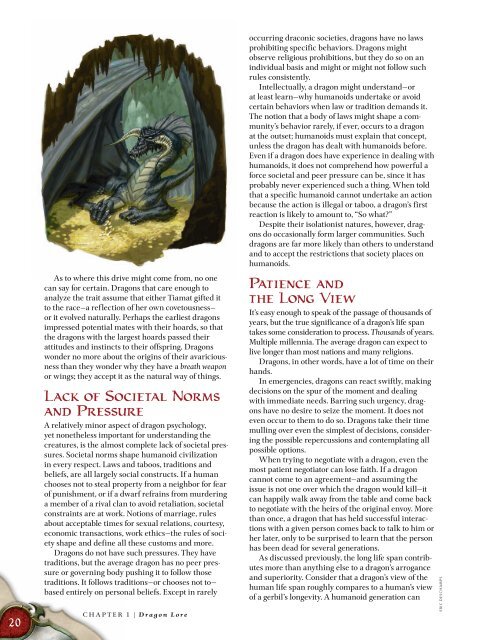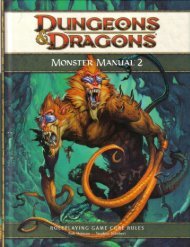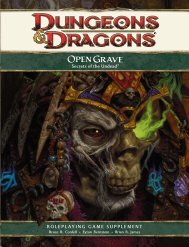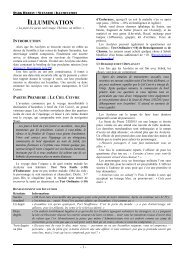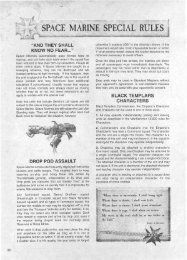Create successful ePaper yourself
Turn your PDF publications into a flip-book with our unique Google optimized e-Paper software.
20As to where this drive might come from, no onecan say for certain. Dragons that care enough toanalyze the trait assume that either Tiamat gifted itto the race—a reflection of her own covetousness—or it evolved naturally. Perhaps the earliest <strong>dragons</strong>impressed potential mates with their hoards, so thatthe <strong>dragons</strong> with the largest hoards passed theirattitudes and instincts to their offspring. Dragonswonder no more about the origins of their avariciousnessthan they wonder why they have a breath weaponor wings; they accept it as the natural way of things.Lack of Societal Normsand PressureA relatively minor aspect of dragon psychology,yet nonetheless important for understanding thecreatures, is the almost complete lack of societal pressures.Societal norms shape humanoid civilizationin every respect. Laws and taboos, traditions andbeliefs, are all largely social constructs. If a humanchooses not to steal property from a neighbor for fearof punishment, or if a dwarf refrains from murderinga member of a rival clan to avoid retaliation, societalconstraints are at work. Notions of marriage, rulesabout acceptable times for sexual relations, courtesy,economic transactions, work ethics—the rules of societyshape and define all these customs and more.Dragons do not have such pressures. They havetraditions, but the average dragon has no peer pressureor governing body pushing it to follow thosetraditions. It follows traditions—or chooses not to—based entirely on personal beliefs. Except in rarelyCHAPTER 1 | Dragon Loreoccurring draconic societies, <strong>dragons</strong> have no lawsprohibiting specific behaviors. Dragons mightobserve religious prohibitions, but they do so on anindividual basis and might or might not follow suchrules consistently.Intellectually, a dragon might understand—orat least learn—why humanoids undertake or avoidcertain behaviors when law or tradition demands it.The notion that a body of laws might shape a community’sbehavior rarely, if ever, occurs to a dragonat the outset; humanoids must explain that concept,unless the dragon has dealt with humanoids before.Even if a dragon does have experience in dealing withhumanoids, it does not comprehend how powerful aforce societal and peer pressure can be, since it hasprobably never experienced such a thing. When toldthat a specific humanoid cannot undertake an actionbecause the action is illegal or taboo, a dragon’s firstreaction is likely to amount to, “So what?”Despite their isolationist natures, however, <strong>dragons</strong>do occasionally form larger communities. Such<strong>dragons</strong> are far more likely than others to understandand to accept the restrictions that society places onhumanoids.Patience andthe Long ViewIt’s easy enough to speak of the passage of thousands ofyears, but the true significance of a dragon’s life spantakes some consideration to process. Thousands of years.Multiple millennia. The average dragon can expect tolive longer than most nations and many religions.Dragons, in other words, have a lot of time on theirhands.In emergencies, <strong>dragons</strong> can react swiftly, makingdecisions on the spur of the moment and dealingwith immediate needs. Barring such urgency, <strong>dragons</strong>have no desire to seize the moment. It does noteven occur to them to do so. Dragons take their timemulling over even the simplest of decisions, consideringthe possible repercussions and contemplating allpossible options.When trying to negotiate with a dragon, even themost patient negotiator can lose faith. If a dragoncannot come to an agreement—and assuming theissue is not one over which the dragon would kill—itcan happily walk away from the table and come backto negotiate with the heirs of the original envoy. Morethan once, a dragon that has held successful interactionswith a given person comes back to talk to him orher later, only to be surprised to learn that the personhas been dead for several generations.As discussed previously, the long life span contributesmore than anything else to a dragon’s arroganceand superiority. Consider that a dragon’s view of thehuman life span roughly compares to a human’s viewof a gerbil’s longevity. A humanoid generation canERIC DESCHAMPS


